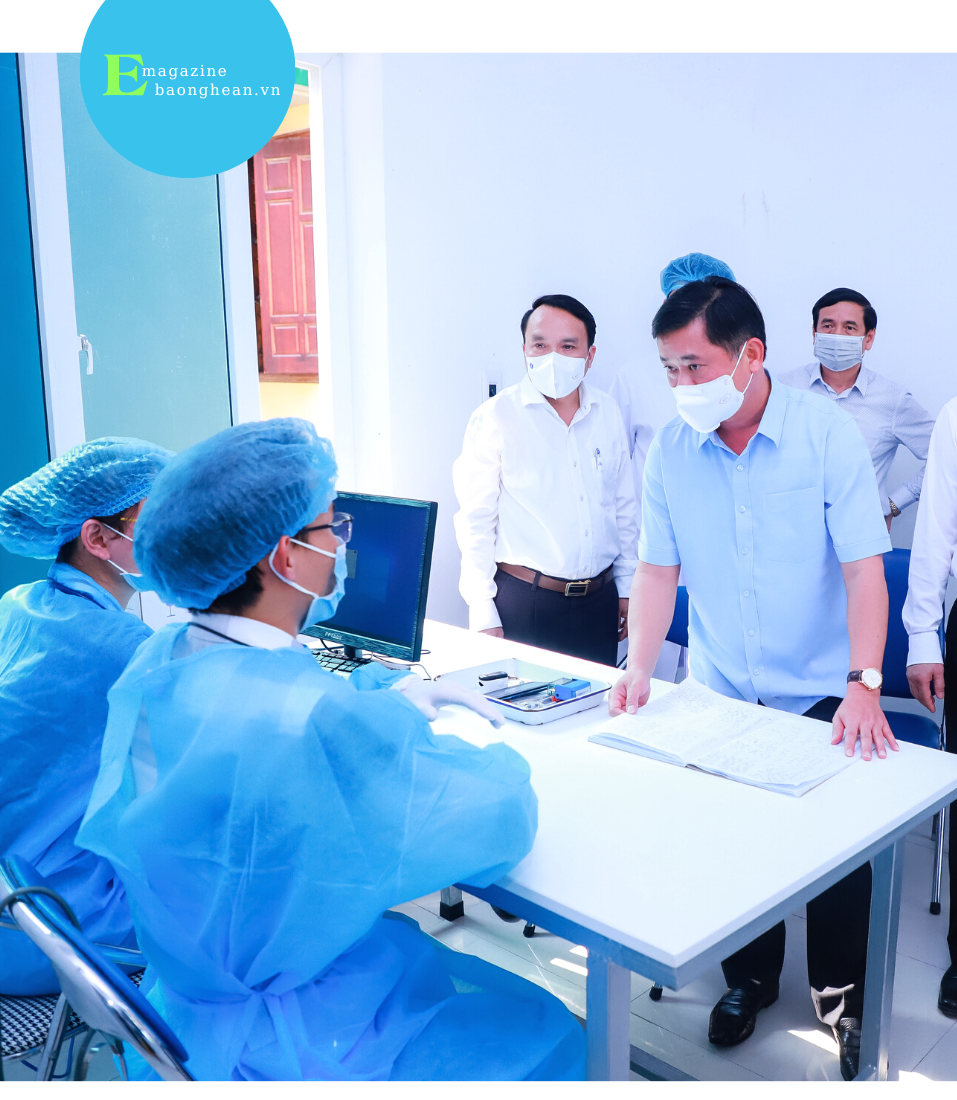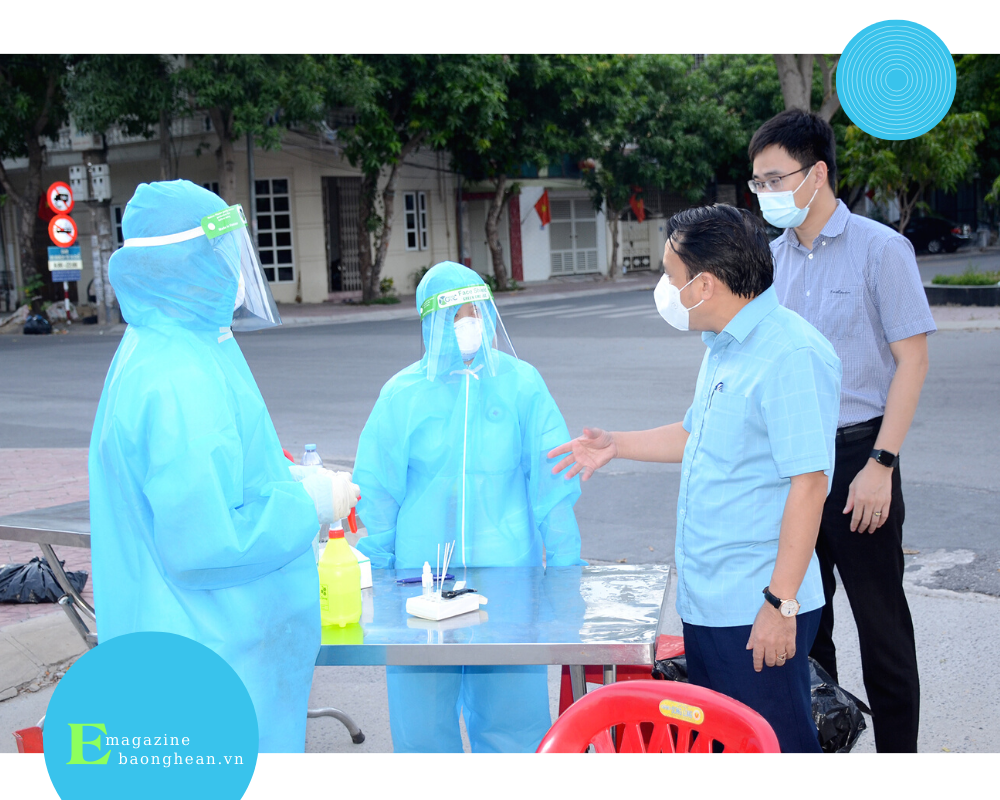


PV:Could you please tell us the current situation and reasons why many health officials and employees in Nghe An have quit their jobs or moved to work at non-public health facilities?
Associate Professor, Dr. Duong Dinh Chinh:During and after the Covid-19 pandemic, as well as the general situation of the whole country, Nghe An also had many health officials and employees resigning and transferring to non-public health facilities. Specifically, from the beginning of 2021 to June 2022, there were a total of 119 people, including 53 doctors.

The main reason is low income, especially at preventive and primary health facilities. At these public health service units, the main source of operating funds comes from the state budget, and the revenue from the service is low... At health service units that are assigned autonomy in regular expenses, because the price of medical services for people with health insurance cards is low because all the factors that make up the price of medical services have not been taken into account, the revenue from the service is also low. These units are not able to pay their employees properly...
In localities, policies to attract medical staff are not strong enough, have not really created motivation to retain medical staff and create attraction for young, qualified and capable medical staff to feel secure in their work.

Meanwhile, health workers also have to take care of their family life, ensure minimum living conditions for food, clothing, and housing, and the costs of electricity, water, and education are increasingly high due to the increase in prices. At the same time, in Nghe An, the system of private hospitals and private clinics is very developed. Here, the working environment is increasingly favorable, modern, and friendly; there is a need to recruit doctors, nurses, and medical technicians, especially highly qualified and specialized health workers and health officials with medical practice certificates. Private health facilities are willing to offer high incomes to attract health workers, while public health facilities do not have a mechanism to retain and promote qualified health workers.
Back to the story, why in the past, although salaries were so low, did so few health workers quit or change jobs? The answer is, now the work pressure on health workers is very high. In autonomous units, they often have to save human resources, there is no recruitment quota while the number of patients increases a lot. At the same time, the demands of patients on medical services, medical environment, and the service attitude of health workers are increasing day by day. If health workers themselves do not do well at some point, it will affect the unit and the whole industry. Without the sympathy of the people and patients, the mindset of health workers will always be heavy.
Another reason is the working environment. For doctors, the working environment is very important. In the past, doctors liked to work in public hospitals to have more opportunities to improve their skills. But now, due to the impact of violations of legal regulations in bidding for the purchase of drugs, supplies, and medical equipment in recent times, the working environment of health workers has been affected: lack of modern equipment to implement advanced techniques, lack of drugs, even lack of consumables, common tools and equipment, including lack of necessary protective equipment, has limited the development of professional qualifications and capacity of health workers, so health workers tend to move to private health facilities with better working conditions and environments.

PV: Does the fact that many health officials and employees have resigned and moved to the non-public health sector affect the overall work of protecting and taking care of people's health?
Associate Professor, Dr. Duong Dinh Chinh:The fact that medical staff in Nghe An have resigned and moved to work at non-public facilities will have some local impacts and difficulties at public facilities, but it is not large. Reality has shown that the number of such staff is relatively isolated, not too outstanding, not irreplaceable, but completely re-arrangeable. Overall, this impact is even smaller because in reality, public and private health care both have the goal of implementing medical examination and treatment, protecting and taking care of people's health. Of course, public health facilities have heavier tasks, are more pioneering in disease prevention and training, and supporting lower levels.
At this time, in the public health system of Nghe An, the source of high-quality human resources is very large; with more than 4,100 doctors. The ratio of 12.2 doctors/10,000 people is higher than the national average. Every year, the industry recruits a lot of human resources, for example, in 2021, 740 medical staff were recruited, including 358 doctors. It is estimated that by 2025, in Nghe An, the ratio of doctors/10,000 people will be 13 doctors/10,000 people.

Of the more than 4,100 doctors, there are over 1,100 with postgraduate qualifications, nearly 150 with level 2 specialist doctors, 25 with PhDs (currently training 25 more). Currently, the training and development of human resources in the health sector is receiving great attention and support from the Provincial People's Committee and other departments. Many postgraduate training courses are opened. Each year, the sector has about 300 more people receiving postgraduate training.
Comparing the rate of health workers quitting and transferring jobs with the rate of health workers being recruited and trained, it can be seen that: In the next 5 years, the fact that health workers quit and transfer to the non-public sector will have little impact. With the current force, with the industry's attractive training policy, and the support of the province, the number of transfers could even be 2-3 times more, but it would not affect the work of protecting and taking care of people's health in general.
PV:Could you tell us what solutions are needed to “retain” health workers in public health facilities? As well as ensure the effective and stable operation of the public health system?
Associate Professor, Dr. Duong Dinh Chinh:As mentioned, to ensure the effective and stable operation of the public health system, training is the most fundamental solution to deal with this transition. However, there also needs to be more good solutions to harmonize public and private health care, operate the public health system such as ensuring fairness in salaries, increased income, improving the working environment, motivating and sharing the pressure of health officials and employees.

Like many others, health workers also need “food to support their faith”. Therefore, it is necessary to amend policies so that public health facilities can increase the income of their workers.
In addition, it is necessary to allow the Ministry of Health to correctly and fully calculate the prices of medical services, including the prices of medical examination and treatment services covered by health insurance, as a basis to encourage medical service units to increase the provision of quality services, increase the unit's revenue, and contribute to increasing the income of medical staff and civil servants...
Localities also need to have mechanisms and policies to attract enough medical human resources, especially doctors, to work in the area; invest in and improve working conditions for medical facilities in the area, enhance capacity for grassroots health care to provide quality medical services right at the grassroots level, contributing to ensuring fairness and efficiency in caring for and protecting people's health.

Next, it is necessary to invest in improving the environment and working conditions for health workers, purchasing enough equipment, supplies, and medicines according to the needs of health workers, helping health workers to provide health services that meet the needs of the people, while developing technical expertise. Heads of public service units need to create a friendly, open, transparent, democratic working environment, building a workplace culture that creates conditions for health workers to be attached to, proud of their profession and proud of their work unit. In that environment, if health workers are increasingly perfected, then "retention" will certainly be much more sustainable.
PV:Thank you!
